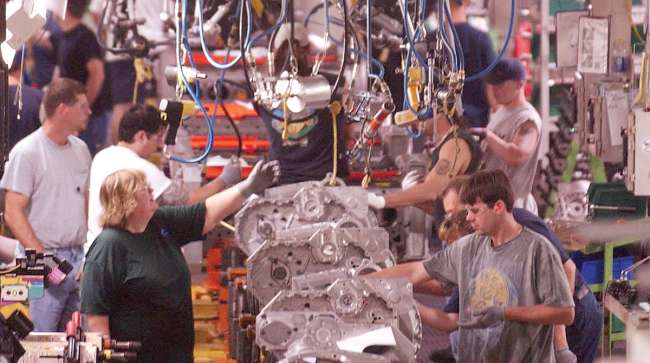Senior Reporter
Cummins to Lay Off 2,000 Salaried Workers

[Stay on top of transportation news: Get TTNews in your inbox.]
Two thousand salaried Cummins employees will be laid off in the first quarter of 2020, the Columbus, Ind.-based engine manufacturer announced Nov. 25.
Cummins, which has a global workforce of 62,600, attributed the decision to softening demand in the trucking industry.
“As we communicated with our employees last week, demand has deteriorated even faster than expected, and we need to adjust our cost structure,” spokesman Jon Mills said in a statement to Transport Topics. “We have successfully navigated downturn cycles before, and we have a strategic plan in place to manage throughout this downturn.”
Mills said it is not clear yet which locations or departments will be impacted. He also said the company previously announced layoffs of salaried employees at its manufacturing plants across the country to manage production.
“We have already taken several actions in response to declining revenues,” he said. “This includes reduced discretionary spending across the company, several global efforts to optimize our operations, voluntary headcount reductions, and we continue to align production with demand at our manufacturing facilities.”
According to data from FTR Transportation Intelligence, heavy-duty truck orders plunged by 51% in October compared with 2018. And October typically is the busiest month of the year for new truck orders. October orders reached their lowest point since 2016.
Cummins is the largest manufacturer of Class 8 truck engines, holding a 38.1% 2018 market share compared with competitors Volvo/Mack and Daimler.
Cummins’ leadership told shareholders last week in a presentation to analysts about its plan to increase profitability amid the downturn in the industry. The company said structural costs would be reduced up to $300 million next year and plans are to continue investing in fuel cell and hydrogen fuel technologies.

Linebarger
“Our leadership in powertrain technology has been instrumental in driving strong returns for Cummins shareholders,” CEO Tom Linebarger said at the meeting. “Cummins has continued to advance its diesel and natural gas powertrains while we have increased our focus on battery and fuel cell technologies, providing customers with the products and support for all of their powertrain needs.”
Industry analyst Jeff Kauffman with Loop Capital told Transport Topics that officials with Cummins telegraphed the pending layoffs during that analyst meeting, and he believes the company will use the cuts to reassess its business plan.
“To me, this was just a public announcement of what they had announced at the analyst meeting the week before,” he said. “I think it goes a little beyond what is taking place at the factory. I think this is more broad sweeping than just what is going on with hydrogen fuel cells. This is based on where they see the market going for the next 18 months.”
The end of 2017 and 2018 were record-setting periods for many trucking companies. In 2019, however, the economy has cooled, and spot and contract rates have fallen and truck sales have leveled off.
Economist Rajeev Dhawan, director of the Economic Forecasting Center at Georgia State University in Atlanta, told TT that when demand is high, as in 2018, many firms spend capital in anticipation of new business. But once demand slips, it makes new investments harder to justify. He said that is happening in trucking as companies cut back on purchasing new vehicles.
“When the companies pull back on changing or replacing their aging fleets, it shows up as layoffs for the truck manufacturers,” he said. “If they don’t put in new truck orders, then the engine makers are not going to make that many engines, and lay off people. This is classic boom and bust.”
Cummins saw its 2019 third-quarter revenue drop by 3% when it released earnings Oct. 29. The company said it expects first-quarter revenue to dip 2%, partly because of a decrease in demand for new diesel engines.
Want more news? Listen to today's daily briefing:




